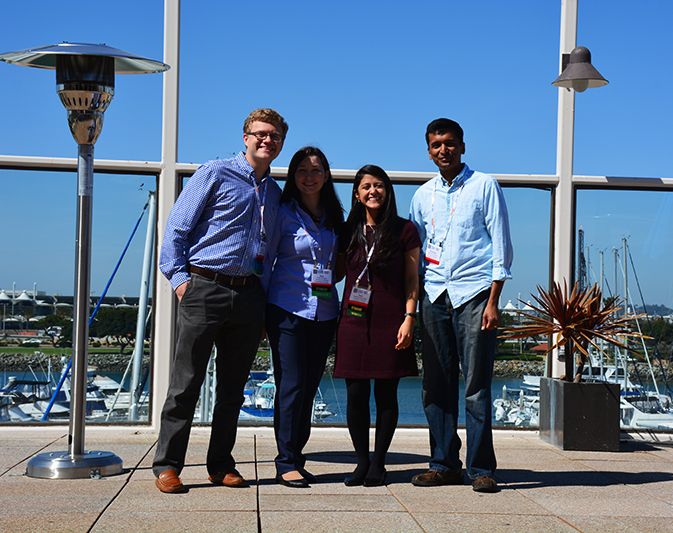From April 2-5, Kyle Quinn and Narasimhan Rajaram, both assistant professors of biomedical engineering, attended the Optical Society's annual Biophotonics Congress. Held this year in San Diego, the congress focused on optics in the life sciences and featured more than 55 technical sessions and over 270 presentations.
Quinn, a program committee member for the Novel Techniques in Microscopy Meeting, hosted a grant writing workshop at the conference with Paul Campagnola, a professor of biomedical engineering at the University of Wisconsin. The purpose of the workshop was to aid young investigators in developing competitive grant proposals for the National Science Foundation and National Institute of Health. Quinn shared his insights with students and postdocs on writing successful NIH career development grants.
Kyle Quinn presents during his grant writing workshop. (Photo courtesy of Hannah Walter of the Optical Society) |
Three of Rajaram's students also presented at the conference. Daria Semeniak, who will graduate this year with a master's degree in biomedical engineering, presented a talk entitled, "Determining the Sensitivity of Diffuse Reflectance Spectroscopy to Dose- and Depth-Dependent Changes in Tumor Oxygenation after Radiation Therapy." Mason Harper, who will graduate this year with a bachelor's degree in biomedical engineering, presented a talk entitled, "Optical Metabolic Imaging of Metabolic Adaptability as a Marker for Metastatic Potential." Paola Monterroso Diaz, a senior graduating in fall 2017, presented a talk entitled, "Quantitative Diffuse Optical Spectroscopy of Short-term Reoxygenation Kinetics in Radiation-Resistant and Sensitive Tumors."
For the students, these talks are a way to share their work with other top researchers in their field. Said Rajaram, "[It is] a tremendous achievement, especially for undergraduates, to receive such an honor." To help support the cost of their research and/or conference travel, Semeniak received a travel grant from the graduate school, Monterroso Diaz received funding from the Arkansas Biosciences Institute, and Harper received an Honors College Research Grant and Honors College Travel Grant.
Topics
Contacts
Elizabeth DeMeo, media specialist
Biomedical Engineering
479-575-4667,
